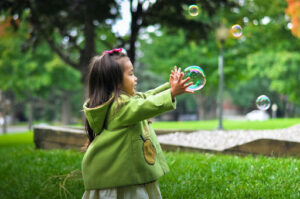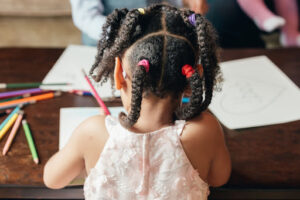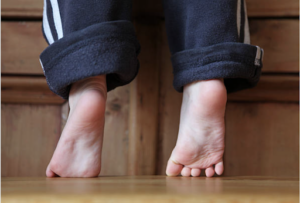
In this post, we are going to discuss the strange term “torticollis,” how it can be impacting your infant, and how parents and physical therapists can help treat this and aid in your infant’s physical development.

In this post, we are going to discuss the strange term “torticollis,” how it can be impacting your infant, and how parents and physical therapists can help treat this and aid in your infant’s physical development.

Neurodiversity – An Overview:
March 13th through March 19th, 2023 is Neurodiversity Celebration Week! The term neurodiversity refers to the diversity of human minds, including the infinite variation in neurodevelopment within our species. This concept shifts away from the medical model of pathology and towards a strengths-based perspective in which differences are valued. For further information on this topic, see the blog post entitled Neurodiversity Means Natural Variety in the Human Brain, written by Caroline Stevens, MS, OTR/L.
Coloring a superhero coloring page, making a chalk racetrack on the driveway, or having a white board drawing competition can all be ways for your child to practice their grasp. As your child grows, the grasp they use on their writing utensil will change and can be a sign of their evolving fine motor skills. By the approximate ages listed, your child should be demonstrating these types of grasp on their writing utensil.

What is Hand Dominance?
Children should be able to use both hands in play. However, as tasks become increasingly complex, almost all children develop one hand that they use automatically to act on other objects. Hand dominance is not a preference, but a developmental process that allows the brain to advance their skills.

Collection of Christmas present boxes on a light blue background
This time of year, the same question seems to be on everyone’s mind… “What should I get the child(ren) in my life this holiday season?” Here is a guide of my favorite gifts for the children in your lives that are both fun and encourage development!

You have been told to expect your child to use “one word by one year.” Great! Does this happen magically? Are there skills you should be looking for? What strategies can you implement throughout your child’s first year to facilitate their language development? We often expect that children will just “catch on” and begin speaking. For some children, this strategy works; but for many children, they need more support. Sometimes this means seeking a full speech and language evaluation; but other times, you as caregivers can implement simple strategies to help your child gain new skills.

Halloween is right around the corner and while it is a highly anticipated event for many children, it can be a challenging time for those with sensory processing differences. With the wide array of sounds, sights and textures, Halloween is a sensory-rich holiday that can be overwhelming. But, with a bit of planning and consideration of each child’s unique strengths and needs, families can enjoy the festivities while navigating the many sensory experiences that Halloween brings!

It’s that time of year where everywhere you look you see pumpkins! Not only do they get in the fall spirit but did you know that there are several activities you can do with a pumpkin that can help nurture your child’s development! Below are four ways that you and your child can have endless fun with just a pumpkin.
Your child’s Visual perceptual skills are an important set of skills that help them understand the world around them. So, what are visual perceptual skills? Visual perceptual skills are the ability to visually take in information and interpret that information to give it a meaning. There are seven different skills that make up visual perceptual skills. They are the the following:
Visual discrimination
Determining differences/ similarities between
objects such as size, shape, color, etc.
Visual sequential memory
The ability to recall visual sequences/
patterns
Form constancy
Identifying that an object is the same object regardless of its orientation, size, color, etc.
Visual closure
Identifying an object or person even if you can’t see the entire picture.
Visual memory
The ability to recognize visual traits of an object.
Visual spatial relations
Determining the relationships between the objects in your environment.
Visual figure ground
The ability to locate an object in a
visually busy environment.
Questions or concerns?
If you have questions or concerns about your child’s visual perceptual skills, please contact us at info@playworkschicago.com or 773-332-9439.
Urooba Khaleelullah, MOT, OTR/L
Occupational Therapist

What is toe walking?
Toe walking can be described as walking on the toes or the balls of our feet without heel contact on the ground. It commonly can be described as your child always on their “tiptoes”. Some children with diagnoses such as cerebral palsy, muscular dystrophy, or autism may be seen walking on their toes. If a child is toe walking for an unknown cause, it can be described as idiopathic toe walking. Idiopathic toe walking is characterized by toe walking that is not occurring because of an underlying anatomical or neuromuscular cause. Factors that may play into idiopathic toe walking include;